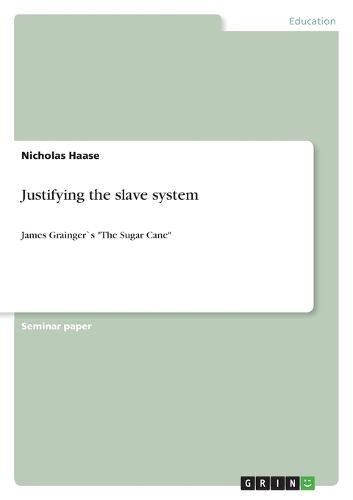Readings Newsletter
Become a Readings Member to make your shopping experience even easier.
Sign in or sign up for free!
You’re not far away from qualifying for FREE standard shipping within Australia
You’ve qualified for FREE standard shipping within Australia
The cart is loading…






Seminar paper from the year 2008 in the subject English - History of Literature, Eras, grade: 2,0, University of Goettingen (Seminar fur Englische Philologie), course: Of Cannibals and Promised Lands: Typology in early American literature, language: English, abstract: 1. Introduction The subject for this term paper is James Grainger’s approach to use the means of georgic poetry to justify the slave system in the 18th century. The primary object of my study is Grainger’s poem The Sugar Cane, which was written in West-Indian georgic style. First of all I will give a short explanation of georgic poems and their history. Then I will turn to Charles Woodmason, who emigrated to South Carolina and was responsible for many georgic poems in the New World giving the farmers extensive agricultural advices. Exemplified by Woodmason"s Indico I will point out the typical characteristics of a georgic poem. Next I will focus on James Grainger and his poem The Sugar Cane. He lived and worked on the Caribbean islands as a doctor and provided medical care for the slaves. He wrote down his experiences in the poem and gave detailed information for his readers in Britain and Europe about the West Indies. Furthermore I will explore the significance of sugar for empire building and the poetics of empire. In addition I will thoroughly analyze The Sugar Cane since responses to Grainger’s poem in the eighteenth century were quite contradictory. On the one hand he justified slavery and the plantation system and on the other hand he condemned the colonial project and slavery. I will show some passages from the poem as examples for the thesis of justification of slavery and the antithesis of criticism of slavery. Finally I will try to work out and present ways on how he overcomes the contradiction between empire and freedom. At at the end I will give a short summary and some concluding thoughts. 2. Georgic poems According to The New Princeton Encyclopaedia of Poetry and Poetics (1993) a geo
$9.00 standard shipping within Australia
FREE standard shipping within Australia for orders over $100.00
Express & International shipping calculated at checkout
Seminar paper from the year 2008 in the subject English - History of Literature, Eras, grade: 2,0, University of Goettingen (Seminar fur Englische Philologie), course: Of Cannibals and Promised Lands: Typology in early American literature, language: English, abstract: 1. Introduction The subject for this term paper is James Grainger’s approach to use the means of georgic poetry to justify the slave system in the 18th century. The primary object of my study is Grainger’s poem The Sugar Cane, which was written in West-Indian georgic style. First of all I will give a short explanation of georgic poems and their history. Then I will turn to Charles Woodmason, who emigrated to South Carolina and was responsible for many georgic poems in the New World giving the farmers extensive agricultural advices. Exemplified by Woodmason"s Indico I will point out the typical characteristics of a georgic poem. Next I will focus on James Grainger and his poem The Sugar Cane. He lived and worked on the Caribbean islands as a doctor and provided medical care for the slaves. He wrote down his experiences in the poem and gave detailed information for his readers in Britain and Europe about the West Indies. Furthermore I will explore the significance of sugar for empire building and the poetics of empire. In addition I will thoroughly analyze The Sugar Cane since responses to Grainger’s poem in the eighteenth century were quite contradictory. On the one hand he justified slavery and the plantation system and on the other hand he condemned the colonial project and slavery. I will show some passages from the poem as examples for the thesis of justification of slavery and the antithesis of criticism of slavery. Finally I will try to work out and present ways on how he overcomes the contradiction between empire and freedom. At at the end I will give a short summary and some concluding thoughts. 2. Georgic poems According to The New Princeton Encyclopaedia of Poetry and Poetics (1993) a geo